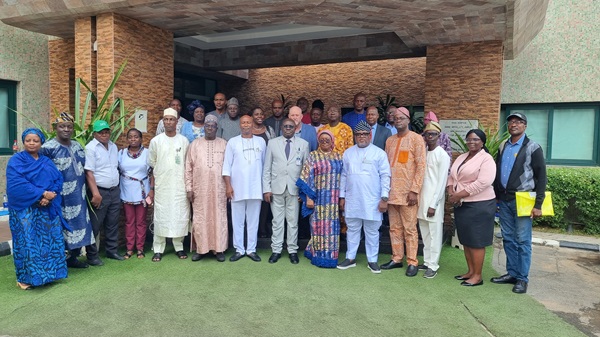
The Federal Ministry of Agriculture and Food Security (FMAFS) has described the loss of plant genetic diversity as a significant setback to Nigeria’s food security ambitions, warning that without urgent action, the nation could face serious agricultural vulnerabilities.
Speaking at a one-day advocacy workshop on plant genetic resources conservation and use, held in Abuja, the permanent secretary of the ministry, Dr. Marcus Ogunbiyi called on stakeholders to raise awareness, harmonise efforts and mobilise action to preserve, document and utilise Nigeria’s rich plant genetic heritage in ways that serve both current and future generations.
According to him, the country’s wealth of genetic diversity, including crops like yams, cassava, maize, millet, rice, and sorghum, forms the backbone of its food systems and traditional diets. Yet, this heritage is increasingly threatened by global temperature rises, shifting rainfall patterns, pest outbreaks and population pressures.
“In the face of climate change and rising food demand, the conservation and sustainable use of these genetic resources is not optional – it is imperative,” Ogunbiyi stated. “The loss of plant genetic diversity threatens crop productivity, resilience, and the nutritional quality of food, and could diminish our capacity to adapt to future challenges.”
He praised the organisers and stakeholders of the Seed for Resilience (SFR) project, describing their collaboration as vital in recognising that Nigeria’s agricultural future depends not only on inputs and markets but also on the genetic foundations of the crops cultivated.
Also speaking, the permanent secretary of the Federal Ministry of Innovation, Science and Technology, Esuabana Nko-Asanye underscored the pivotal role of plant genetic resources in achieving food security and transforming agriculture in Nigeria. She urged all stakeholders to see conservation as a shared responsibility that must be upheld for the prosperity of future generations.
“We must protect and preserve these genetic resources as they hold the key to transforming lives and securing our agricultural systems for generations to come,” Esuabana said. “The Ministry remains open to strategic conversations and ideas that can accelerate our progress towards national food security, especially in line with the Renewed Hope Agenda of the current administration.”
In his address, director-general of the National Biotechnology Research and Development Agency (NBRDA), Prof Abdullahi Mustapha described the Seed for Resilience project as a forward-thinking initiative and a strategic response to Nigeria’s food and nutrition security challenges.
He noted that conservation and effective use of plant genetic resources would enable the country to build resilience against climate shocks, enhance agricultural productivity and support long-term sustainability.
“At NBRDA, through our dedicated National Centre for Genetic Resources and Biotechnology (NACGRAB), we have been at the forefront of efforts to safeguard plant genetic resources,” Mustapha explained. “These efforts are not theoretical—they are vital to building agricultural resilience and ensuring a stable food supply for our growing population.”
Mustapha further pointed out that a diverse genetic pool enables the development of new crop varieties that are resistant to pests, disease and environmental stress, thereby fortifying the entire food value chain.
In a presentation that highlighted the project’s milestones, director of NACGRAB, Dr. Anthony Okere commended the five-year Seed for Resilience project for catalysing tangible change across Nigeria’s agricultural landscape.
He said the project, which began in 2021 through a partnership with the Global Crop Diversity Trust, aimed to strengthen the efficiency of the national genebank while promoting the wider use of conserved germplasm by farmers and researchers alike.
“Millions of Nigerian farmers are poised to benefit from this project’s results in the coming years,” Okere said. “We have successfully established farmer clusters that now serve as early adopters and ambassadors of resilient crop varieties. These groups are future drivers of food security, particularly in the face of climate change.”
He explained that through the project, NACGRAB’s capabilities had been significantly upgraded with modern equipment, better documentation, and digitised access to genetic materials. The resources conserved at the genebank are now visible and accessible to researchers worldwide through a global platform, facilitating international collaboration.
Okere emphasised that these upgrades directly align with Nigeria’s broader goal to mitigate the impacts of climate change, increase food security, and support agricultural development through improved crop resilience.
The Seed for Resilience project has helped bridge the gap between genetic research and practical farming, encouraging the inclusion of smallholder farmers in efforts to build climate-smart agriculture. By exposing farmers to diverse, stress-tolerant crop varieties, the project has demonstrated the value of conserving biodiversity in the fight against hunger and environmental degradation.
As Nigeria winds down the Seed for Resilience project, stakeholders hailed it as a transformative initiative with long-term impact. The event served as a rallying point for continued investment in genetic conservation, ensuring that Nigerian agriculture remains adaptable, productive, and sustainable in the face of an uncertain climate future.

